- Home
- Daniel Quinn
Ishmael: An Adventure of the Mind and Spirit Page 6
Ishmael: An Adventure of the Mind and Spirit Read online
Page 6
“Exactly,” Ishmael said. “You’re beginning to get the idea.”
8
“Do you have a feeling now for where you might find the other parts of this story—the middle and the end?”
I gave this some thought. “I’d watch Nova, I think.”
“Why?”
“I’d say that if Nova was doing the story of creation, the story I told today would be the outline. All I have to do now is figure out how they’d do the rest.”
“Then that’s your next assignment. Tomorrow I want to hear the middle of the story.”
FOUR
1
“Okay,” I said. “I think I have the middle and the end of the story down pat.”
Ishmael nodded and I started the tape recorder.
“What I did was start with the premise: The world was made for man. Then I asked myself how I would write the story as a treatment for Nova. It came out like this:
“The world was made for man, but it took him a long, long time to figure that out. For nearly three million years he lived as though the world had been made for jellyfish. That is, he lived as though he were just like any other creature, as though he were a lion or a wombat.”
“What exactly does it mean to live like a lion or a wombat?”
“It means … to live at the mercy of the world. It means to live without having any control over your environment.”
“I see. Go on.”
“Okay. In this condition, man could not be truly man. He couldn’t develop a truly human way of life—a way of life that was distinctively human. So, during the early part of his life—actually the greater part of his life—man just foozled along getting nowhere and doing nothing.
“As it happened, there was a key problem to be solved, and it was this that took me a long time to work out: what the problem was. Man could get nowhere living like a lion or a wombat, because if you’re a lion or a wombat…. In order to accomplish anything, man had to settle down in one place where he could get to work, so to speak. I mean that it was impossible for him to get beyond a certain point living out in the open as a hunter-gatherer, always moving from place to place in search of food. To get beyond that point, he had to settle down, had to have a permanent base from which he could begin to master his environment.
“Okay. Why not? I mean, well, what was stopping him from doing that? What was stopping him was the fact that if he settled down in one place for more than a few weeks, he’d starve. As a hunter-gatherer, he would simply clean the place out—there would be nothing left to hunt and gather. In order to achieve settlement, man had to learn one fundamental manipulation. He had to learn how to manipulate his environment so that this food-exhaustion didn’t occur. He had to manipulate it so that it produced more human food. In other words, he had to become an agriculturalist.
“This was the turning point. The world had been made for man, but he was unable to take possession of it until this problem was cracked. And he finally cracked it about ten thousand years ago, back there in the Fertile Crescent. This was a very big moment—the biggest in human history up to this point. Man was at last free of all those restraints that…. The limitations of the hunting-gathering life had kept man in check for three million years. With agriculture, those limitations vanished, and his rise was meteoric. Settlement gave rise to division of labor. Division of labor gave rise to technology. With the rise of technology came trade and commerce. With trade and commerce came mathematics and literacy and science, and all the rest. The whole thing was under way at last, and the rest, as they say, is history.
“And that’s the middle of the story.”
2
“Very impressive,” Ishmael said. “I’m sure you realize that the ‘big moment’ you’ve just described was in fact the birth of your culture.”
“Yes.”
“It should be pointed out, however, that the notion that agriculture spread across the world from a single point of origin is distinctly old hat. Nevertheless the Fertile Crescent remains the legendary birthplace of agriculture, at least in the West, and this has a special importance that we’ll look at later on.”
“Okay.”
“Yesterday’s part of the story revealed the meaning of the world as it’s understood among the Takers: The world is a human life-support system, a machine designed to produce and sustain human life.”
“Right.”
“Today’s part of the story seems to be about the destiny of man. Obviously it was not man’s destiny to live like a lion or a wombat.”
“That’s right.”
“What is man’s destiny then?”
“Hm,” I said. “Well. Man’s destiny is … to achieve, to accomplish great things.”
“As it’s known among the Takers, man’s destiny is more specific than that.”
“Well, I suppose you could say that his destiny is to build civilization.”
“Think mythologically.”
“I’m afraid I don’t know how that’s done.”
“I’ll demonstrate. Listen.”
I listened.
3
“As we saw yesterday, creation wasn’t complete when jellyfish appeared or when amphibians appeared or when reptiles appeared or even when mammals appeared. According to your mythology, it was complete only when man appeared.”
“Right.”
“Why was the world and the universe incomplete without man? Why did the world and the universe need man?”
“I don’t know.”
“Well, think about it. Think about the world without man. Imagine the world without man.”
“Okay,” I said, and closed my eyes. A couple minutes later I told him I was imagining the world without man.
“What’s it like?”
“I don’t know. It’s just the world.”
“Where are you?”
“What do you mean?”
“Where are you looking at it from?”
“Oh. From above. From outer space.”
“What are you doing up there?”
“I don’t know.”
“Why aren’t you down on the surface?”
“I don’t know. Without man on it … I’m just a visitor, an alien.”
“Well, go on down to the surface.”
“Okay,” I said, but after a minute I went on to say, “That’s interesting. I’d rather not go down there.”
“Why? What’s down there?”
I laughed. “The jungle is down there.”
“I see. You mean, ‘Nature, red in tooth and claw … Dragons of the prime that tare each other in their slime.’”
“That’s it.”
“And what would happen if you did go down there?”
“I’d be one of the ones the dragons were tearing in their slime.”
I opened my eyes in time to see Ishmael nodding. “And it is at this point that we begin to see where man fits into the divine scheme. The gods didn’t mean to leave the world a jungle, did they?”
“You mean in our mythology? Certainly not.”
“So: Without man, the world was unfinished, was just nature, red in tooth and claw. It was in chaos, in a state of primeval anarchy.”
“That’s right. That’s it exactly.”
“So it needed what?”
“It needed someone to come in and … straighten it out. Someone to put it in order.”
“And what sort of person is it who straightens things out? What sort of person takes anarchy in hand and puts it in order?”
“Well … a ruler. A king.”
“Of course. The world needed a ruler. It needed man.”
“Yes.”
“So now we have a clearer idea what this story is all about: The world was made for man, and man was made to rule it.”
“Yes. That’s very obvious now. Everyone understands that.”
“And this is what?”
“What?”
“Is this fact?”
“No.”
“T
hen what is it?”
“It’s mythology,” I said.
“Of which no trace is to be found in your culture.”
“That’s right.”
Once again Ishmael stared at me glumly through the glass.
“Look,” I said after a bit. “The things you’re showing me, the things you’re doing, are … almost beyond belief. I know that. But it’s just not in me to leap up out of my chair while striking my brow and crying, ‘My God, this is incredible!’”
He wrinkled his forehead thoughtfully for a moment before saying: “What’s wrong with you then?”
He seemed so genuinely concerned that I had to smile.
“All frozen inside,” I told him. “An iceberg.”
He shook his head, sorry for me.
4
“To return to our subject…. As you say, it took man a long, long time to tumble to the fact that he was meant for greater things than he could achieve living like a lion or a wombat. For some three million years he was just part of the anarchy, was just one more creature rolling around in the slime.”
“Right.”
“It was only about ten thousand years ago that he finally realized that his place was not in the slime. He had to lift himself out of the slime and take this place in hand and straighten it out.”
“Right.”
“But the world didn’t meekly submit to human rule, did it?”
“No.”
“No, the world defied him. What man built up, the wind and rain tore down. The fields he cleared for his crops and his villages, the jungle fought to reclaim. The seeds he sowed, the birds snatched away. The shoots he nurtured, the insects nibbled. The harvest he stored, the mice plundered. The animals he bred and fed, the wolves and foxes stole away. The mountains, the rivers, and the oceans stood in their places and would not make way for him. The earthquake, the flood, the hurricane, the blizzard, and the drought would not disappear at his command.”
“True.”
“The world would not meekly submit to man’s rule, so he had to do what to it?”
“What do you mean?”
“If the king comes to a city that will not submit to his rule, what does he have to do?”
“He has to conquer it.”
“Of course. In order to make himself the ruler of the world, man first had to conquer it.”
“Good lord,” I said—and nearly leaped up out of my chair while striking my brow and all the rest.
“Yes?”
“You hear this fifty times a day. You can turn on the radio or the television and hear it every hour. Man is conquering the deserts, man is conquering the oceans, man is conquering the atom, man is conquering the elements, man is conquering outer space.”
Ishmael smiled. “You didn’t believe me when I said that this story is ambient in your culture. Now you see what I mean. The mythology of your culture hums in your ears so constantly that no one pays the slightest bit of attention to it. Of course man is conquering space and the atom and the deserts and the oceans and the elements. According to your mythology, this is what he was born to do.”
“Yes. That’s very clear now.”
5
“Now the first two parts of the story have come together: The world was made for man, and man was made to conquer and rule it. And how does the second part contribute to your explanation of how things came to be this way?”
“Let me think about that…. Once again this is a sort of sneaky way of blaming the gods. They made the world for man, and they made man to conquer and rule it—which he eventually did. And this is how things came to be the way they are.”
“Nail it down. Go a little deeper.”
I closed my eyes and gave it a couple of minutes, but nothing came.
Ishmael nodded toward the windows. “All this—all your triumphs and tragedies, all your marvels and miseries—are a direct result of … what?”
I chewed on it for a while, but I still couldn’t see what he was getting at.
“Try it this way,” Ishmael said. “Things wouldn’t be the way they are if the gods had meant man to live like a lion or a wombat, would they?”
“No.”
“Man’s destiny was to conquer and rule the world. So things came to be this way as a direct result of …?”
“Of man fulfilling his destiny.”
“Of course. And he had to fulfill his destiny, didn’t he?”
“Yes, absolutely.”
“So what is there to get excited about?”
“Very true, very true.”
“As the Takers see it, all this is simply the price of becoming human.”
“How do you mean?”
“It wasn’t possible to become fully human living beside the dragons in the slime, was it?”
“No.”
“In order to become fully human, man had to pull himself out of the slime. And all this is the result. As the Takers see it, the gods gave man the same choice they gave Achilles: a brief life of glory or a long, uneventful life in obscurity. And the Takers chose a brief life of glory.”
“Yes, that’s certainly how it’s understood. People just shrug and say, ‘Well, this is the price that had to be paid for indoor plumbing and central heating and air conditioning and automobiles and all the rest.’” I gave him a quizzical look. “And what are you saying?”
“I’m saying that the price you’ve paid is not the price of becoming human. It’s not even the price of having the things you just mentioned. It’s the price of enacting a story that casts mankind as the enemy of the world.”
FIVE
1
“We have the beginning and middle of the story together,” Ishmael said when we started the next day. “Man is finally beginning to fulfill his destiny. The conquest of the world is under way. And how does the story end?”
“I guess I should have kept on going yesterday. I’ve sort of lost the thread.”
“Perhaps it would help to listen to the way the second part ends.”
“Good idea.” I rewound a minute or so of tape and let it play: “Man was at last free of all those restraints that…. The limitations of the hunting-gathering life had kept man in check for three million years. With agriculture, those limitations vanished, and his rise was meteoric. Settlement gave rise to division of labor. Division of labor gave rise to technology. With the rise of technology came trade and commerce. With trade and commerce came mathematics and literacy and science, and all the rest. The whole thing was under way at last, and the rest, as they say, is history.”
“Right,” I said. “Okay. Man’s destiny was to conquer and rule the world, and this is what he’s done—almost. He hasn’t quite made it, and it looks as though this may be his undoing. The problem is that man’s conquest of the world has itself devastated the world. And in spite of all the mastery we’ve attained, we don’t have enough mastery to stop devastating the world—or to repair the devastation we’ve already wrought. We’ve poured our poisons into the world as though it were a bottomless pit—and we go on pouring our poisons into the world. We’ve gobbled up irreplaceable resources as though they could never run out—and we go on gobbling them up. It’s hard to imagine how the world could survive another century of this abuse, but nobody’s really doing anything about it. It’s a problem our children will have to solve, or their children.
“Only one thing can save us. We have to increase our mastery of the world. All this damage has come about through our conquest of the world, but we have to go on conquering it until our rule is absolute. Then, when we’re in complete control, everything will be fine. We’ll have fusion power. No pollution. We’ll turn the rain on and off. We’ll grow a bushel of wheat in a square centimeter. We’ll turn the oceans into farms. We’ll control the weather—no more hurricanes, no more tornadoes, no more droughts, no more untimely frosts. We’ll make the clouds release their water over the land instead of dumping it uselessly into the oceans. All the life processes of this planet will be where they b
elong—where the gods meant them to be—in our hands. And we’ll manipulate them the way a programmer manipulates a computer.
“And that’s where it stands right now. We have to carry the conquest forward. And carrying it forward is either going to destroy the world or turn it into a paradise—into the paradise it was meant to be under human rule.
“And if we manage to do this—if we finally manage to make ourselves the absolute rulers of the world—then nothing can stop us. Then we move into the Star Trek era. Man moves out into space to conquer and rule the entire universe. And that may be the ultimate destiny of man: to conquer and rule the entire universe. That’s how wonderful man is.”
2
To my astonishment, Ishmael picked up a wand from his pile and waved it at me in an enthusiastic gesture of approval. “Once again, that was excellent,” he said, neatly biting off its leafy head.
“But you realize, of course, that if you’d been telling this part of the story a hundred years ago—or even fifty years ago—you would have spoken only of the paradise to come. The idea that man’s conquest of the world could be anything but beneficial would have been unthinkable to you. Until the last three or four decades, the people of your culture had no doubt that things were just going to go on getting better and better and better forever. There was no conceivable end in sight.”
“Yes, that’s so.”
“There is, however, one element of the story that you’ve left out, and we need it to complete your culture’s explanation of how things came to be this way.”
“What element is that?”
“I think you can figure it out. So far we have this much: The world was made for man to conquer and rule, and under human rule it was meant to become a paradise. This clearly has to be followed by a ‘but.’ It has always been followed by a ‘but.’ This is because the Takers have always perceived that the world was far short of the paradise it was meant to be.”

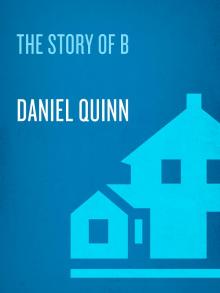 The Story of B
The Story of B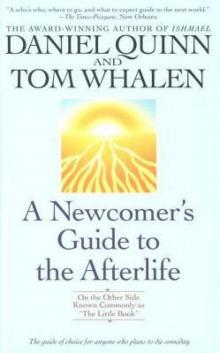 A Newcomer's Guide to the Afterlife: On the Other Side Known Commonly as the Little Book
A Newcomer's Guide to the Afterlife: On the Other Side Known Commonly as the Little Book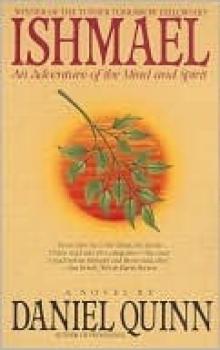 Ishmael: An Adventure of the Mind and Spirit
Ishmael: An Adventure of the Mind and Spirit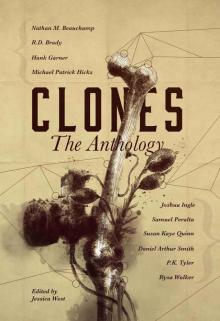 CLONES: The Anthology
CLONES: The Anthology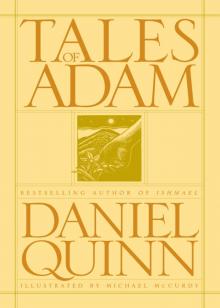 Tales of Adam
Tales of Adam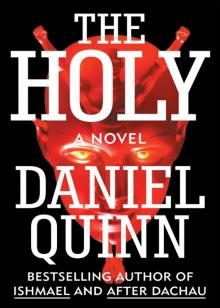 The Holy
The Holy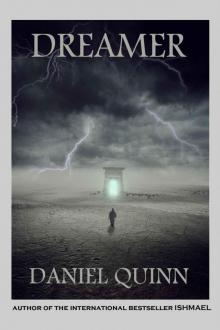 Dreamer
Dreamer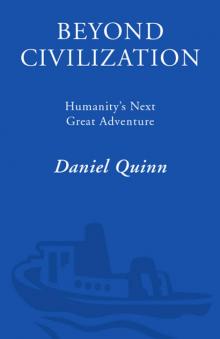 Beyond Civilization: Humanity's Next Great Adventure
Beyond Civilization: Humanity's Next Great Adventure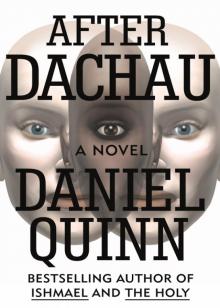 After Dachau
After Dachau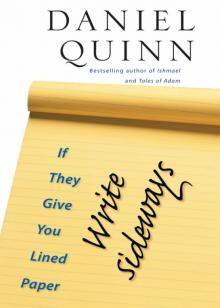 If They Give You Lined Paper, Write Sideways.
If They Give You Lined Paper, Write Sideways.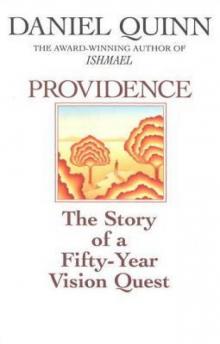 Providence
Providence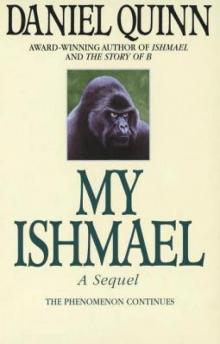 My Ishmael
My Ishmael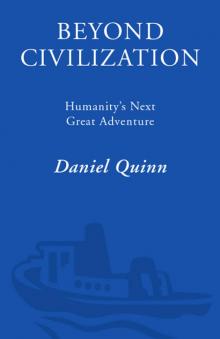 Beyond Civilization
Beyond Civilization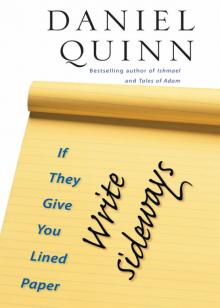 If They Give You Lined Paper, Write Sideways
If They Give You Lined Paper, Write Sideways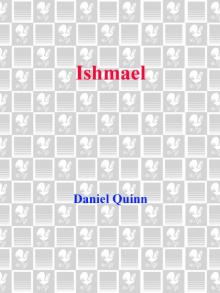 Ishmael
Ishmael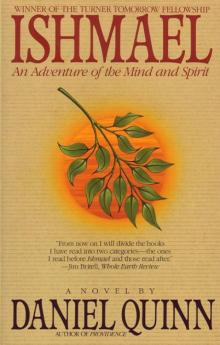 Ishmael i-1
Ishmael i-1 A Newcomer's Guide to the Afterlife
A Newcomer's Guide to the Afterlife